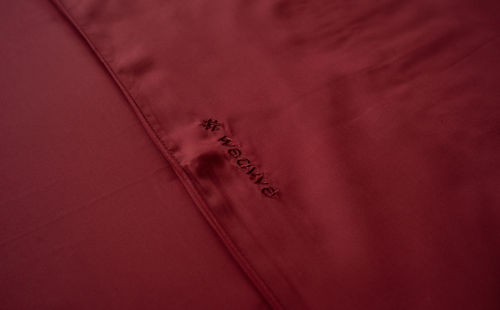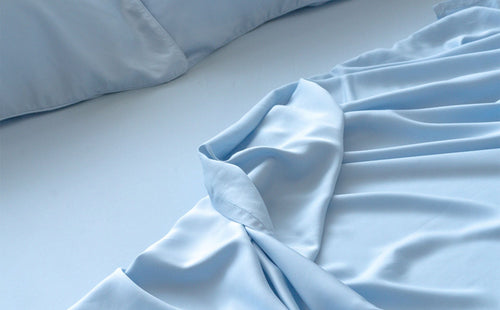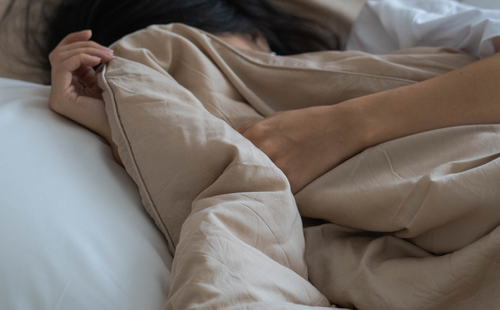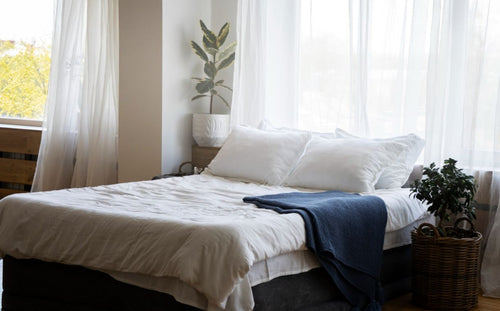At a glance
TENCEL™ fabric stands out for its silky-smooth softness, breathability, and eco-friendly qualities. Compared to cotton, silk, linen, bamboo, and polyester, it offers lasting comfort that’s perfect for Singapore’s hot, humid climate.
Quick tips
- Opt for TENCEL™ bedsheets for breathable, cooling comfort all year.
- Wash gently in cold water to maintain softness and durability.
- Pair with a duvet or cover for extra cosiness and style.
The moment you slip between the sheets, there is a chance the sheets will feel rough, silky, crisp, or almost like a soft puff, which in turn affects your sleep. Softness is more than a luxury; it is a form of comfort that is crucial for rest and the skin. This is probably why the people are asking if TENCEL™ fabric really lives up to such claims.
Smooth, easily breathable, and eco-friendly, TENCEL™ fabric has been referred to as “the next-generation soft,” but how does TENCEL™ compare to cotton, silk, linen, polyester, and bamboo?
Does it feel softer, or is it just a matter of advertisement? This guide will feature TENCEL™ and a “detailed side-by-side comparison” of other fabrics, so you understand what to expect after the switch.
What Makes TENCEL™ Soft
The secret lies in how Lenzing TENCEL™ material is made and the way the fibers interact with the skin.
-
Extra Long Fibres: TENCEL™ uses elongate, continuous fibers taken from sustainable wood pulp sources. Long fibers mean there are fewer exposed ends. With less exposed ends, there is minimal friction to be encountered, resulting in a smoother, softer surface than fabrics made with coarse short fibers.
-
Moisture Management: Like any rough fabric, rough textures can feel uncomfortable due to sweat accumulation. For example, cotton fabric. It can absorb moisture; however, it has a slower evaporation rate. On the other hand, TENCEL™ fabric absorbs moisture 50% faster than cotton and evaporates moisture even faster. This keeps the fabric dry and comfortable.
Featuring Weavve’s Signature TENCEL™ Deluxe Set
-
Breathable Weave: TENCEL™ is a soft and breathable fabric. TENCEL™ bed sheets facilitate free air circulation, preventing heat retention and creating an airy, lightweight feel that users describe as "weightless."
-
Gentle on Skin: TENCEL™ fabric is recommended by dermatologists for sensitive skin due to its smooth surface, which prevents irritation and micro-abrasions that can occur with synthetic materials.
-
Durable Softness: TENCEL™ fabric retains its soft and smooth feel even after repeated washing, unlike linen, which tends to stiffen and only softens over time.
Comparing TENCEL™ Softness with Other Fabrics
Now, let’s compare the touch and feel of TENCEL™ fabric to other fabrics you are likely to be familiar with.
|
Fabric |
Compared to TENCEL™ |
|
Cotton |
TENCEL™ is softer from the start, while cotton may need several washes to feel as smooth. |
|
Silk |
Both are very soft, but TENCEL™ is more breathable and absorbent, easier to care for, and usually much more affordable than silk. |
|
Linen |
TENCEL™ is softer and drapier right away, while linen starts coarse and only softens with time. |
|
Bamboo |
Both are smooth and soft, but TENCEL™ is lighter, more breathable, and regulates moisture better. |
|
Polyester / Synthetics |
Synthetics can feel warm or clingy, while TENCEL™ stays breathable and comfortable, making it ideal for hot climates such as Singapore. |
TENCEL™ vs Cotton
A common question is: “Which is softer, TENCEL™ or cotton?” Cotton softness is determined by the thread count and quality. Low thread count cotton sheets feel rough, and premium Egyptian cotton with a 300 to 600 thread count feels smooth and luxurious. Even the very best cotton eventually softens after several washes.
TENCEL™ fabric, however, has a natural smoothness. No matter the thread count, its fibers have a silken surface that feels soft against the skin. The other difference is in the performance of the fabric in hot, humid climates.
For example, Cotton absorbs perspiration and can feel humid or wet. In contrast, TENCEL™ fabric continues to feel fresh, light, and breathable. This means that a large number of sleepers in hot or humid regions prefer TENCEL™ bedsheets because they feel softer, cooler, and more breathable than cotton.
Featuring Weavve’s Signature TENCEL™ Fitted Sheet
TENCEL™ vs Silk
Is TENCEL™ softer than silk? No, silk remains the softest natural fiber, and its unmatched ultra-smooth texture and shiny surface certainly have their perks.
On the other hand, silk comes with disadvantages. It is also very fragile, pricey, and can only be hand-washed or dry-cleaned.
TENCEL™ has the luxurious silk-like feel combined with practicality. It is gentle on the skin, has a beautiful fall, and gives an effortless, elegant look without the dry cleaning or high price.
TENCEL™ is also more practical than silk because it is better machine-washable and retains its shape better. It is softer, durable for everyday use, and more affordable.
Featuring Weavve’s TENCEL™ Lyocell Duvet
TENCEL™ vs Linen
Linen is unique for its durable, rustic textured feel, very breathable, and casual for summer. Though linen is very rough at first. It may take months or even years of washing to soften.
TENCEL™ is very soft and silky and does not require a break-in period, and over time, linen does not smooth out. Linen has high breathability, and TENCEL™ offers cooling, moisture-wicking properties, adding another layer of comfort.
So, "Which is better, TENCEL™ or linen?". If you appreciate relaxed aesthetics, linen is the choice. If you prefer effortless softness and comfort, then choose TENCEL™.
TENCEL™ vs Bamboo
When comparing TENCEL™ and bamboo sheets, the main differences come down to production and performance.
TENCEL™ is made using a closed-loop process that recycles water and solvents, making it more eco-friendly than bamboo, which often requires intensive chemical processing. It also absorbs and releases moisture more efficiently, keeping you cooler and drier in humid climates like Singapore. For softness, sustainability, and lasting comfort, TENCEL™ sheets are the better choice over bamboo.
TENCEL™ vs Polyester & Synthetics
Unlike TENCEL™ and other fabrics, polyester and other synthetics achieve a soft feel through surface treatments rather than inherent fiber properties.
This "artificial softness" does not provide breathability, leading to the trapping of heat and moisture, which can make polyester sheets feel warm and uncomfortable, particularly on hot days. TENCEL™ offers genuine softness without chemical finishes.
At Weavve, our Signature TENCEL™ Collection is not only crafted for comfort in Singapore’s tropical climate but is also OEKO-TEX® Standard 100 Certified, meaning they’re tested to be free from harmful substances — safe even for sensitive skin.
How TENCEL™ Feels Against the Skin
What does TENCEL™ material feel like? Lenzing describes TENCEL™ fabric as having a remarkably smooth and silky fibre structure.
But what truly matters is how real users experience it. Customers of Weavve’s TENCEL™ sheets often highlight the unmatched comfort, describing them as cloud-like, silky, soothing, and perfect for hot nights.
Frequently Asked Questions
Is TENCEL™ Good for Hot Weather?
Yes, TENCEL™ fabric is an excellent choice for hot and humid weather. The surface remains cool and dry because its fibers are made to wick away moisture more effectively than cotton. It is perfect for year-round use, particularly in hotter climates like Singapore, because it is breathable and prevents heat from being trapped between your skin and the sheets.
Does TENCEL™ Wrinkle After Washing?
TENCEL™ fabrics naturally resist wrinkles and usually dry with a smoother finish than many other materials. To minimise creasing, take them out of the washer as soon as the cycle ends and let them air-dry by hanging or laying them flat away from direct sunlight. If any wrinkles remain, a gentle steam or a warm iron on low heat will help smooth them out.
Is TENCEL™ More Like Cotton or Polyester?
TENCEL™ feels similar to cotton but has a smoother texture. It has the same natural origin and breathability as cotton, but it lacks the sharpness that cotton occasionally has. Unlike polyester, TENCEL™ does not trap heat or adhere to the body. Consider it an eco-friendly, silky-soft alternative to cotton that has none of the problems with polyester.
Does TENCEL™ Stink Like Polyester?
No, one of the most common complaints about polyester is that it retains scents after washing. On the other hand, TENCEL™ contains moisture-wicking and antibacterial characteristics, reducing bacterial growth, which is the main cause of residual odour. This ensures that it remains fresher for longer, especially in hot temperatures.
How to Keep TENCEL™ Soft?
Lenzing TENCEL™ fabric is naturally smooth and silky thanks to its fine fibres — not chemical treatments. To help your sheets stay soft and comfortable:
- Wash gently in cold water (below 30°C) using a mild liquid detergent.
- Avoid bleach, harsh powders, and fabric softeners as they can damage the fibres.
- Line dry away from direct sunlight; if needed, iron on low heat.
With proper care, TENCEL™ bed sheets remain beautifully soft even after many washes. For more details, see our care guide.
How to Prevent TENCEL™ From Pilling?
Wash TENCEL™ on a gentle, cold cycle with mild detergent, avoiding fabric softeners and bleach. Turn it inside out, launder separately to prevent snags, and let it air dry. Pilling due to abrasion is inevitable, so we recommend using a razor blade to gently comb out any fuzz balls.
Silky Smooth TENCEL™ Bedsheets for Singapore Nights
At Weavve, our TENCEL™ bed sheets are not just defined by their features - they’ve been recognised by customers as truly some of the softest sheets to sleep on.
Crafted from 100% TENCEL™ and OEKO-TEX® Standard 100 Certified, they’re safe even for the most sensitive skin. If you’re searching for the best TENCEL™ bed sheets in Singapore, explore our Signature TENCEL™ Collection and experience softness that lasts night after night.











































